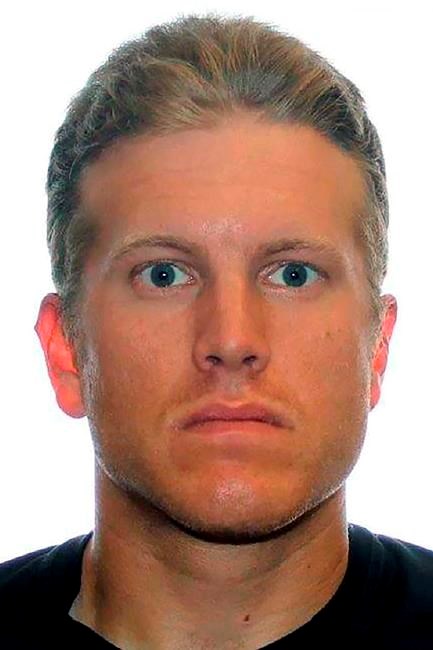GREENBELT, Md. — Former Canadian Armed Forces reservist Patrik Mathews was sentenced Thursday to nine years in prison for his role in what investigators called a violent plot to exploit escalating American social tensions and trigger a "race war" in the United States.
Prior to sentencing, Mathews, 28, of Beausejour, Man., addressed District Court Judge Theodore Chuang directly, attributing his decision to join the white supremacist group The Base as a colossal failure of judgment.
But Mathews never said he was sorry, Chuang observed as he handed down a prison term squarely between the 25 years sought by prosecutors and the 33 months his defence lawyers had been hoping for.
"I did not hear any particular apology to our country," the judge told the accused.
"To me, it's galling to think someone who's not an American would know better than us what kind of country we should have here, and decide that you hate America so much, you're going to infiltrate our country and … tear it down."
Mathews pleaded guilty in June to weapons charges linked to the plot, as did his co-defendant, U.S. army veteran Brian Mark Lemley Jr., who received an identical nine-year sentence at a separate hearing.
"In the letter you submitted, you didn't necessarily inspire confidence that you've changed to the point that there's no longer a threat of violence from you," Chuang told Mathews.
"Nevertheless, you have stated that all you want to do is go back to Canada and live a normal life. We all hope that is something that will happen … once you serve this sentence."
Mathews was also sentenced to three years of supervised release upon completion of his prison term, at which point he'll be deported back to Canada. The defence petitioned the court to allow him to serve the sentence at a facility in Minnesota in order to be closer to family members in Manitoba.
"I got involved with the wrong people," he said, pushing his long brown hair back over his head.
He said he originally believed The Base to be a group committed to less extreme ideals, like immigration controls — a perspective he acknowledged was "horrifically and disastrously wrong."
Chuang agreed earlier this week to the prosecution's request for a "terrorism enhancement," which would have allowed a sentence of up to 25 years behind bars. Defence counsel had argued for a sentence of less than three years, since the defendants ultimately never acted out their plan.
"We're disappointed the sentence didn't end up at the low end," defence attorney Joseph Balter said outside court. The pair may have used a lot of incendiary, distasteful rhetoric, but were never serious about acting on it, he argued.
"There was a lot of bluster, there was a lot of hyperbole, a lot of rhetoric. And that was the argument we made to the court," Balter said. "The court took it all in, it was very carefully considered, and it ended up as it did."
Since their arrests in January 2020, court heard ample evidence of the pair talking in stark terms about killing federal officials, derailing trains and poisoning water supplies as part of their violent, disruptive scheme.
At its heart was a massive rally by gun rights activists at the state capitol in Richmond., Va., where the pair were counting on clashes between police and tens of thousands of heavily armed protesters angry about proposed gun control measures. They were arrested just days before the rally was scheduled to take place.
Both men pleaded guilty in June to charges that included illegally transporting a firearm and obstruction of justice. A third co-defendant, William Garfield Bilbrough IV, pleaded guilty in December to helping Mathews enter the U.S. illegally. He was sentenced to five years in prison.
"These men sought to divide our community based on hate, and through acts of violence and terror," said Erek Barron, a former state delegate in Maryland who became the first Black U.S. attorney for the state earlier this month.
"They collected and assembled weapons and ammunition, trained for acts of violence, vetted others for their cause, and attempted to recruit like-minded extremists. Today's sentences, though, make clear that their hateful efforts failed."
Balter suggested the time has come for the legal system to consider how easily susceptible individuals with no true criminal intent can find themselves pulled into dangerous internet rabbit holes.
"The court said that it's something to be taken very, very seriously, because of the fact that these threats on the country are very, very serious," he said.
"By the same token, from our standpoint — especially someone like Patrik, who is susceptible to those kinds of influences — the question becomes, well, how should that be taken into account."
Mathews' father, Glen, read a brief statement in open court Thursday in which he described his son as a troubled soul with a good heart whose childhood was a tortured ritual of schoolyard bullying and alienation.
"I always felt Pat had a strong moral compass," he said. "Right and wrong was always important, even though the definitions aren't very clear these days."
He said when his son's engagement began to disintegrate, "he found another interest that filled the void, unfortunately." And he dismissed the notion that his son could be a racist: "He's just too kind."
Mathews' mother, Kim Monk, paused outside the courthouse to speak to reporters and defend her son.
"People back home, they know who he is — and he hasn't changed," Monk said. "He's the same kind person he is."
This report by The Canadian Press was first published Oct. 28, 2021.
James McCarten, The Canadian Press
Note to readers: This is a corrected story. An earlier version reported that a hearing earlier this week took place on Tuesday.




